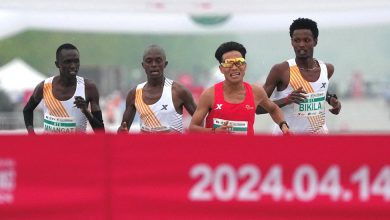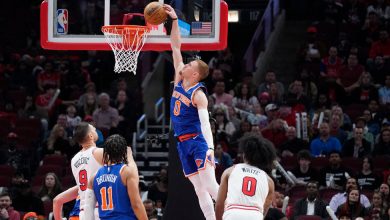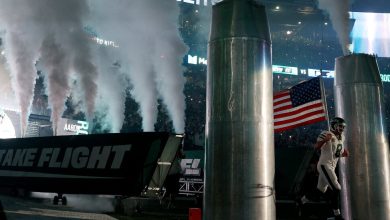For Jamaica, a Surplus of Talent and a Lack of Time

LONDON — Sometimes, the best explanation is the simplest one. Last month, in the aftermath of Jamaica’s heavy home defeat to Panama — a result that left the Caribbean country winless and, at that stage, pointless in World Cup qualifying — the finger of blame shifted quickly from the team’s coach, Theodore Whitmore, to his boss, Michael Ricketts.
As president of the Jamaican Football Federation, Ricketts had spent much of the previous year trying to overhaul Whitmore’s squad in a bid to supercharge Jamaica’s attempts to reach its first World Cup in a quarter century.
In March, he revealed a long list of British-born players of Jamaican heritage who, he said, were in the process of switching their international allegiance to the country of their parents’ or grandparents’ birth, immediately — in theory — boosting Jamaica’s chances of making it through the arduous slog of qualification.
His targets were ambitious. The most eye-catching name was Michail Antonio, the West Ham forward who had, relatively late in his career, emerged as one of the most effective strikers in the Premier League. But beyond him lay a slew of equally familiar faces.
Southampton’s Nathan Redmond, the Everton teammates Mason Holgate and Demarai Gray and Newcastle’s Isaac Hayden were all applying for Jamaican passports, Ricketts said. So too were Ethan Pinnock and Ivan Toney, of Brentford, and Max Aarons of Norwich City, some of the brightest talents in the second-tier Championship, and Kemar Roofe, a forward for the Scottish champion, Rangers.
By the time the Panama game arrived, a host of the recruits who had accepted Ricketts’s overtures were in the team. Pinnock and Liam Moore started in central defense. Roofe and Daniel Johnson, of Preston, played in midfield. Antonio made his debut up front, alongside Bobby Decordova-Reid of Fulham.
It did not end well. A few days earlier, without the vast majority of his reinforcements, Whitmore’s team had come within a few minutes of claiming a commendable point on the road in Mexico. Against Panama, though, Jamaica collapsed to a 3-0 defeat.
From the outside, the suspicion was that Ricketts was at fault. It was suggested on television that he had destabilized the team by instructing Whitmore to make room for the new arrivals. “I must dispel that totally,” Ricketts said at the time. He called it “absolute rubbish,” and insisted that Whitmore would back him up. “All the J.F.F. did was make contact with the players, and provide the opportunity for the players to represent the country,” he said.
Roofe, for one, has spent some time ruminating on that defeat. “It left a sour taste in the mouth,” he said. His conclusion, though, was not quite as intriguing as a dark conspiracy about outside interference. The problem, in his mind, was time. Or, rather, the lack of it.
Along with the vast majority of the new additions to Jamaica’s squad, Roofe had been prevented from joining his teammates in Mexico. The country was at the time on the British government’s coronavirus so-called red list, meaning anyone who traveled there would have to spend 10 days in quarantine on their return to Britain.
To circumvent that, it was decided that most of the British-based players would skip the game and head instead to Jamaica. As Whitmore and his squad were preparing to face Mexico, Roofe and a half dozen others were being greeted by representatives of the J.F.F. in Kingston and undergoing their mandatory Covid tests.
“It was a strange experience,” Roofe said. “The actual squad was in Mexico, so the rest of us flew to Jamaica, met the staff, got a couple of training sessions under our belts. It was good to meet the other players, but it meant when the rest of the team came back, it was a bit rushed.”
Roofe and the others introduced themselves, had a single training session — focusing, he said, on “a bit of shape and set pieces” — and then, the next day, went out to play Jamaica’s first home game on a road that, the country hopes, will end in Qatar late next year.
“That is the hardest thing in football, having to adapt quickly,” Roofe said. “You’re playing in a team you don’t know, in a style you don’t know, with a manager and players you haven’t met before, and you have to hit the ground running. You can get lucky, and everything just click, but normally it takes a few games.”
Ideally, the first of those would have come almost immediately after the Panama defeat, but Roofe and the rest of the squad’s British-based contingent did not have chance: Costa Rica, Jamaica’s next opponent, was also on the red list. Only one player contracted to an English team, in fact — Anthony Grant, of third-tier Swindon Town — started in San José, where Jamaica earned a 1-1 draw.
Grant’s case is a little different from many of his new teammates. “I’ve been waiting for the call for years,” he said. “I’d always wanted to play for Jamaica. My grandmother came from there, and went back when she retired. I go every year. I just didn’t really know how you went about it.”
Now 34, after more than a decade establishing himself as a steady but unspectacular presence in England’s lower tiers, he had become a little fatalistic about his international hopes. “I’ve had a good career,” he said. “If this came along, I just saw it as a bonus.”
He was not mentioned as a potential recruit by Ricketts, but earlier this year he received a message from the J.F.F. through Twitter. His first call-up was the Mexico game. He missed the humiliation against Panama, but impressed against Costa Rica.
The divergence in those results has made Jamaica — which entered Thursday’s game against the United States at the bottom of the region’s eight-team table — difficult to assess. There have, so far, been two Jamaicas: the team bolstered by high-profile players from Europe, which as of Thursday had lost its only game to date, and the one without reinforcements, which emerged from its two engagements with a single point but an abundance of credit.
How Jamaica’s qualifying campaign unfurls from here — and how much of a challenge it poses to its forthcoming opponents, the United States and Canada — will depend on how easy it is to forge a coherent whole from those twin strands.
That challenge has been made more complex by the absence of several of Jamaica’s recently-minted internationals from this week’s fixtures: Pinnock, Moore and Daniel Johnson are all missing through injury, as is Leon Bailey, the Aston Villa forward. Grant will sit out the game against the U.S. because of an issue with his visa. And, most notably, Antonio decided against traveling for this round of games after consulting with his club, West Ham.
“It’s tricky if you are not getting a clean run at it,” Roofe said. “You might only need one training session to feel like you belong, but it takes longer to jell fully as a team, to know the intricacies of the players you are playing with.”
There is only one way to solve that particular issue, of course, the same problem that Roofe identified at the root of the defeat to Panama: time.
Both Grant and Roofe said they were confident that the Jamaica team that undertakes these three games will be more cogent than the one that played the previous three. And both feel that the longer World Cup qualifying runs, the more dangerous Jamaica will be. The question, of course, is whether there is enough time to make that count.




